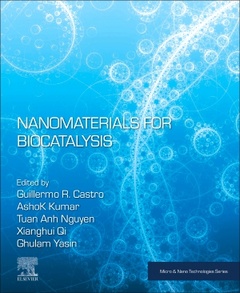Nanomaterials for Biocatalysis Micro and Nano Technologies Series
Coordonnateurs : Castro Guillermo R., Nadda Ashok Kumar, Nguyen Tuan Anh, Qi Xianghui, Yasin Ghulam

Nanomaterials for Biocatalysis explains the fundamental design concepts and emerging applications of nanoscale biocatalysts, such as bioconversions, bioelectronics, biosensors, biocomputing and therapeutic applications. Nano-biocatalysts refers to the incorporation of enzymes into nanomaterials. These enzyme-enhanced nanocarriers have many advantages, including low mass transfer limitation, high enzyme capacity, better stabilization, and the formation of single-enzyme nanoparticles. Smart nanocontainers have been developed for the smart release of their embedded active substances. These smart releases can be obtained by using smart coatings as their outer nanoshells.
In addition, these nanocontainers could protect the enzymes from chemical or metabolic alterations on their delivering pathways towards the target. This is an important reference source for materials scientists and chemical engineers who want to know more about how nanomaterials are being used for biocatalysis applications.
PART 1: BASIC PRINCIPLES1. Nanobiocatalysis: An introduction2. Nanomaterials for enzyme immobilization3. Enzyme in nanocarrierss: Mathematical modeling and simulations4. Mechanisms of interaction of enzymes and supports5. Nanomaterials based artificial enzymes
PART 2: NANOMATERIALS IN BIOCATALYSTS6. Carbon nanotubes/nanorods7. Gold Nanoparticles in biocatalysis8. Graphene oxides nanoparticles in biocatalysis9. Silica nanoparticles in biocatalysis10. Metal oxide nanoparticles in biocatalysis11. Nanostructured organic supports12. Metal organic frameworks for biocatalysis
PART 3: EMERGING APPICATIONS13. Nanobiocatalysists for Bioelectronics and Biosensors14. Nanobiocatalysists for Therapeutic applications15. Nanobiocatalysists for Biotransformations and biodegradations16. Nanobiocatalysists for Drug delivery17. Nanobiocatalysists for Biofuel cells18. Nanobiocatalysists for Stem Cell Applications19. Nanobiocatalysists for Future trends20. Current pilot scale and industrial scale up applications21. Nanobiocatalysists: Conclusion and Future trends
Ashok Kumar is an Assistant Professor, in the Department of Biotechnology and Bioinformatics, at Jaypee University of Information Technology, Waknaghat, India. His research areas are in enzymology, biocatalysis, biopolymers, enzyme immobilization, and bioenergy.
Tuan Anh Nguyen is Principal Research Scientist at the Institute for Tropical Technology, Vietnam Academy of Science and Technology, Hanoi, Vietnam. His research focuses on advanced nanomaterials and nanotechnology for corrosion and materials integrity in transportation systems. His research activities include smart coatings, conducting polymers, corrosion and protection of metals/concrete, antibacterial materials, and advanced nanomaterials.
Xianghui Qi is a Professor in the School of Food & Biological Engineering, Jiangsu University, China. His research interests: biosynthesis of high value-added chemicals by microbes and engineered strains; especially focused on the discovery of novel enzymes and strains, directed evolution and rational design of enzymes, metabolic pathways engineering, biotransformation synthesis, microbial omics and metabolic regulation, fermentation engineering, and molecular mechanism of biosynthesis.
Dr. Ghulam Yasin is working as an Academic Researcher and PI at the School of Environment and Civil Engineering, Dongguan University of Technology, Dongguan, Guangdong, China. H
- Explains the major fabrication techniques and applications of nanobiocatalysts
- Shows how nanobiocatalysts are used in a variety of environmental and biomedical sectors
- Assesses the major challenges associated with the widespread manufacture of nanobiocatalysts
Date de parution : 10-2021
Ouvrage de 754 p.
19x23.3 cm
Thème de Nanomaterials for Biocatalysis :
Mots-clés :
?AchE; Applications; Biocatalysis; Biocatalysts; Biocompatibility; Bioconjugates; Bioelectrochemistry; Bioelectronics; Biofuels; Biomedicines; Biopolymers; Bioprocesses; Biosensing; Biosensor; Biotransformation; CLEAs; Cancer therapy; Carbon materials; Carbon nanoshapes; Carbon nanotube; Carbon nanotubes; Carriers; Cascade synthetic reactions; Catalysis; Covalent conjugation; Disease nanotherapy; Drug delivery; Electrochemical functionalization; Electron microscopy; Electron transfer; Encapsulation; Environmental biotechnology; Enzymatic catalysis; Enzyme; Enzyme applications; Enzyme immobilization; Enzyme nanobiocatalysis; Enzyme stabilization; Enzyme-MOFs composite; Enzyme-like; Enzyme-support interaction; Enzymes; Exo-polygalacturonase; Fe3O4; Fermentation techniques; Fruit juice clarification; GOx; Galactooligosaccharides; Gold; Graphene; HRP; Hydrogen peroxide; Immobilization; In situ encapsulation; Industrial applications; Inorganic-organic hybrid supports; Iron-based nanomaterials; Laccase; Laccases; Lactose intolerance; Lignin peroxidase; Maghemite; Metal nanoparticles; Metal-organic frameworks (MOFs); Metal-organic frameworks; Microparticles; Modification; Nanobiocatalysis; Nanobiohybrids; Nanobiotechnology; Nanocomposite; Nanocomposites; Nanomaterial; Nanomaterial-immobilized enzymes; Nanomaterials; Nanomedicine; Nanoparticle; Nanoparticles; Nanoparticles synthesis; Nanosensor; Nanostructured carriers; Nanostructured materials; Nanosupport; Nanozymes; Organic nanosupports; Organic supports; Pectinases; Peroxidase; Peroxidases; Polymeric micelles; Polymeric nano fibers; Polymeric nanoparticles; Polymers; Pore/channel infiltration; Porous materials; Production; Purification; Silanization; Silica nanoparticles; Single-atom catalysts



